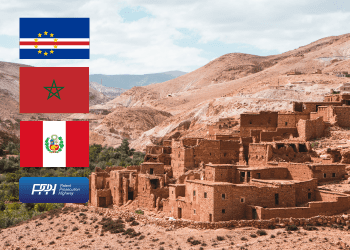Global advancements in the intellectual property sphere

Cape Verde
The IP Office of The Republic of Cape Verde formally deposited its instruments of accession to The African Regional Intellectual Property Organization (ARIPO) on July 14, 2022.
The ARIPO is a regional intergovernmental organisation facilitating cooperation among its member states, now comprising 22 member countries inclusive of the new addition of Cape Verde, which also acceded to the Lusaka Agreement on the establishment of ARIPO, as well as the Harare, Banjul, Swakopmund & Arusha Protocols. As a result, applicants may now obtain protection for inventions, trademarks and industrial designs in Cape Verde by way of filing applications through the ARIPO.
The country additionally joined the Madrid Protocol regarding the International Registration of Marks as of July 6, 2022 allowing trademark applicants from the country to submit their international registration applications through the centralized Madrid system. Likewise the accession affords international applicants the opportunity to designate the Cape Verde for trademark protection.
The system facilitates the registration and maintenance of trademarks internationally, and is administered by the International Bureau (IB) of the World Intellectual Property Organisation (WIPO). It affords applicants the opportunity to file one international application, accompanied by a single set of fees, covering any or all of the Contracting States. The Madrid Union currently has 112 members, covering 128 countries, inclusive of the new addition of Cape Verde.
Peru
The intellectual property office of Peru has recently deposited its instruments of accession in relation to the joining of an additional five international IP treaties.
As such, the country has acceded to the Locarno Agreement, which establishes an International Classification for Industrial Designs and Models. This classification allows for the assignment of classes and subclasses to industrial designs via a corresponding number system, which are used within registration documentation and publication of an application.
Peru has also joined the Nice Agreement, which similarly provides for the classification of products and services for the registration of trademarks, as well as the Strasbourg Agreement Concerning the International Patent Classification, which comprises approximately 80,000 subdivisions. Further, the country acceded to the Geneva Act of the Lisbon Agreement, protecting products which possess special qualities based upon their designations of origin and geographical indications.
Peru is also in the process of reviewing their adherence to an additional seven IP treaties, including the Madrid Agreement on the International Registration of Marks.
Morocco
Morocco deposited its instrument of accession to the Geneva Act of the Hague Agreement on April 22, 2022, marking the 69th contracting party to the Act.
The Act entered into force in relation to Morocco as of July 22, 2022, allowing applicants to seek design protection in all of the 94 countries covered by the Hague System. Previously, applicants from Morocco would only have been able to have sought protection in the 34 states covered by the 1960 Hague Act.
The accession to the Act also means that international design applicants residing outside of Morocco will have the opportunity to designate Morocco for protection through the 1999 Geneva Act.
Through the system, applicants may file one international design application designating the contracting parties in which protection is sought.
An international application can include up to 100 designs, so long as they are all within one class of the Locarno Classification, and must detail at least one reproduction of each design.
PPH
Several countries have implemented or extended their collaborative Patent Prosecution Highway (PPH) projects.
A PPH agreement facilitates the expediency of the processing of patent applications through the fast tracking of the examination process. To achieve this, IP offices utilise a collaborative work share setup, whereby a decision on patent examination made by the office of first filing is shared with the patent office of second filing. The sharing of this data eliminates the need for both offices to conduct the same examination procedure, thus decreasing the workload significantly and shortening the overall patent granting process.
The IP office of France recently signed an initial PPH project bilateral agreement with the IP office of Korea, with the new collaborative work share setup due to be launched on September 1, 2022. This marks the fifth PPH project implemented by France, with the office also collaborating on patent workload data with Japan, the US, Canada, and Brazil.
The existing PPH project between the IP offices of China and Malaysia has been extended for a period of 5 years until June 30, 2027, with the previous term of the project ending on July 1, 2022. The initial pilot project between the two countries was implemented on July 1, 2018.
Furthermore, a meeting in relation to PPH collaboration was also held between the member offices of Prosur, an IP cooperation system consisting of 13 countries in the region of South America. As such, a Memorandum of Understanding (MoU) was signed regarding the implementation of PPH projects between the member states.
The recent global trend in the joining of IP related treaties and collaborative agreements demonstrates a progressive movement towards a more cohesive IP system worldwide.